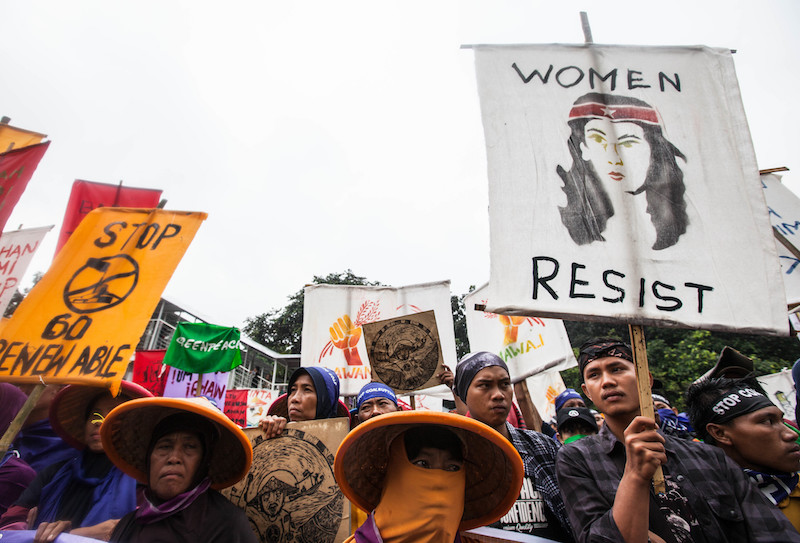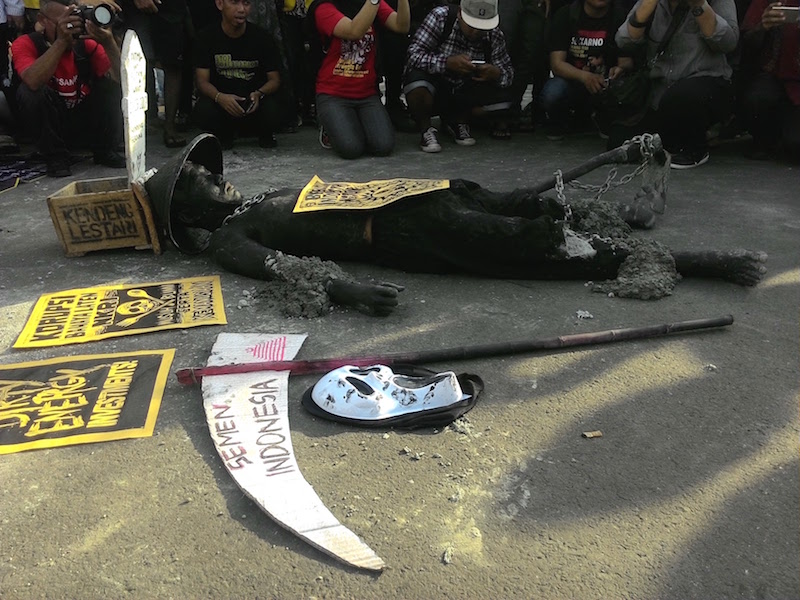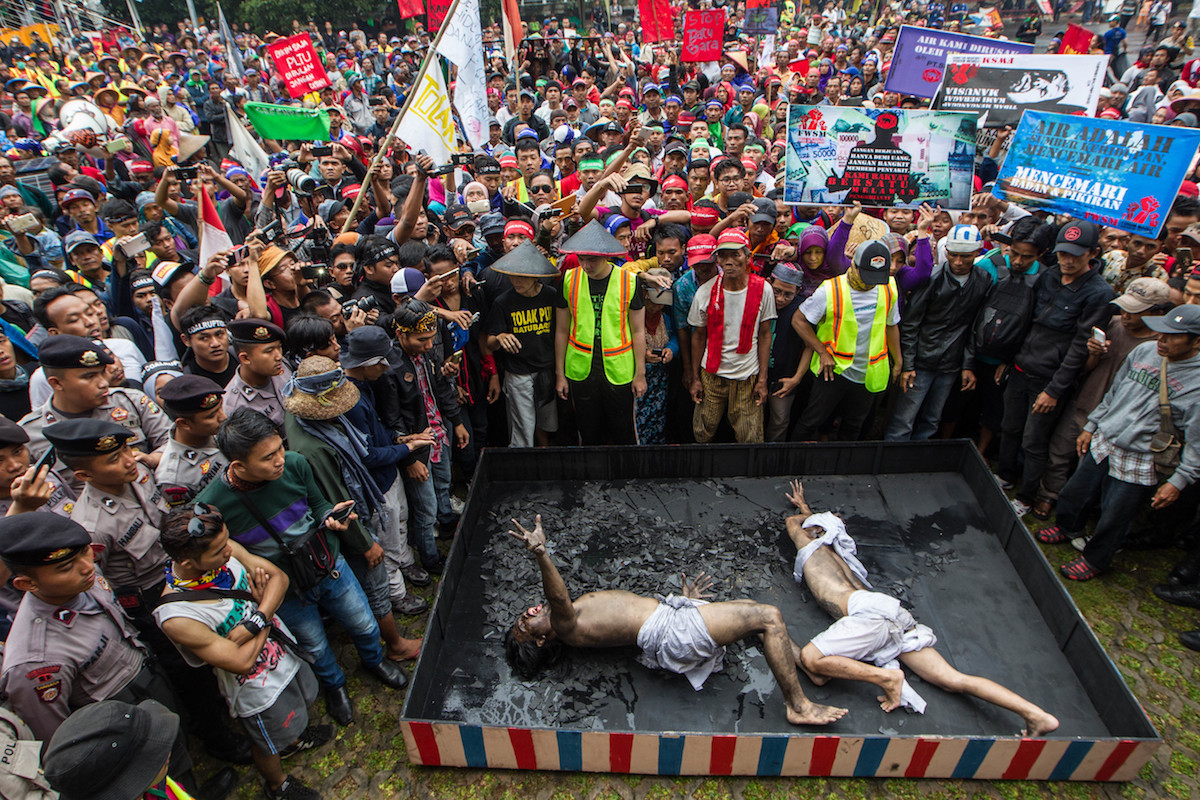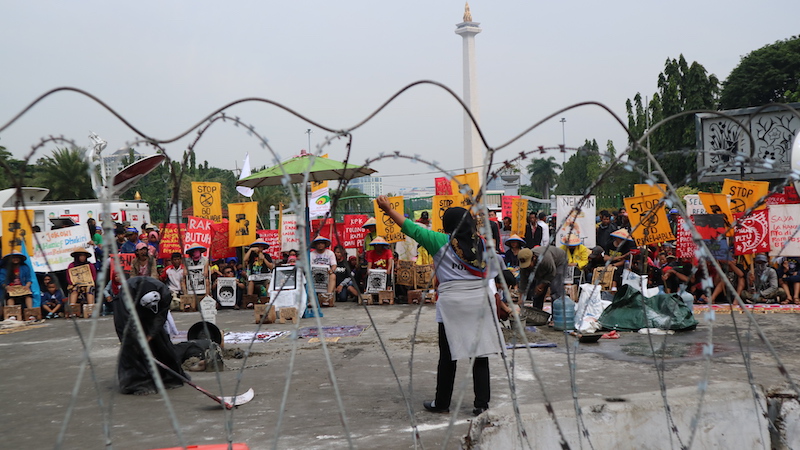- Around 2,000 people, including convoys from communities affected by coal mining and coal-fired power plants, marched in Jakarta on March 23.
- A delegation from the protest was received by Indonesia’s Corruption Eradication Commission (KPK), where they presented reports on cases of alleged corruption.
- Demonstrators also rallied in solidarity with farmers from Kendeng, West Java, who have encased their feet in cement and are staging a sit-in to protest the construction of a cement factory in the Kendeng karst mountain area.
Around 2,000 people from across the Indonesian archipelago gathered in Jakarta last week to call for investigations into cases of alleged corruption in the coal and mineral industry. Demonstrators visited the office of Indonesia’s Corruption Eradication Commission (KPK), bringing forward cases related to Indonesia’s extractive industries.
Junainah, a 36-year-old resident of Rotang, in the Batang district of Central Java, made the eight-hour journey to Jakarta with her husband and children, and 600 other Batang residents. Since 2012, people in Batang have been fighting against the planned construction of a 2,000-megawatt coal-fired power plant.
On March 23, at Jakarta’s Istiqlal mosque, the convoy from Batang joined protestors from other regions affected by coal plants or coal mines: Jepara and Cilicap in Central Java; Cirebon, Pelabuhan Ratu and Indramayu in West Java; Labuan in western Java’s Banten province; Bengkulu in southern Sumatra; and various parts of Kalimantan.

“We continue to fight against the Batang coal-fired power plant,” said Junainah, who like many Indonesians goes by one name. “We have already been fighting for five years. Our fields are already finished. My husband is a fisherman and his fishing grounds are already covered with mud that was dug up during the construction of a dock.”
Junainah’s husband, 41-year-old Karnoto, said he used to catch crabs, squid, fish and shrimp about three miles offshore. “Mud was dumped there. Now it is becoming increasingly difficult to find food,” he said.
Yanto also traveled to Jakarta from Central Java to fight against a power plant. Along with hundreds of other Jepara residents, he came to urge the government to suspend the expansion of the Tanjung Jati B coal-fired power plant. In operation since 2006, the power plant currently has a capacity of 2,640 megawatts, with two additional 1,000-megawatt units (numbers five and six) planned.
“The children are already suffering from air pollution. We want units five and six to be cancelled,” Yanto said.
In a 2015 report, Greenpeace calculated the Tanjung Jati B coal plant in Jepara caused an estimated 1,020 premature deaths per year. This figure includes 400 deaths from stroke, 400 from heart disease, 60 from lung cancer, 90 from chronic respiratory ailments and 20 deaths of children due to acute respiratory infections.

The demonstrations last week were part of an international climate campaign, the Break Free from Fossil Fuels movement. Indonesian NGOs supporting the demonstrations include Indonesian Forum for the Environment (WALHI), Mining Advocacy Network (JATAM), the Auriga foundation, Greenpeace Indonesia and 350.org.
Last year, demonstrations by Break Free partners in Indonesia focused on the Embassy of Japan — due to the government-owned Japan Bank for International Cooperation (JBIC) and private Japanese banks’ involvement in financing coal projects in the country. This year, demonstrators directed their attention to the office of the KPK.
“Coal is dirty energy — not just socially and environmentally. It’s a system that leaves a lot of room for corruption,” said Greenpeace energy campaigner Didit Wicaksono. “Corruption includes any irregularity in the management of natural resources that is financially detrimental to the state.”
Dwi Sawung, urban and energy campaigner at Walhi said that stalled corruption cases relating to mining permits and power plants are clear examples of how coal not only pollutes the environment but is also a dirty business.

A meeting with the KPK
A delegation of protestors and NGO members met with KPK Deputy Chairman Laode M. Syarif. During the meeting, citizens and NGOs submitted reports of alleged corruption in the coal sector. These reports were symbolically represented by an enormous, four-meter by three-meter envelope holding two people rolling in coal ash — meant to represent the tens of thousands of people affected by Indonesia’s coal industry.
Syarif said the KPK is interested in corruption cases in the mining sector. These cases, he said, “must be carried out in accordance with legal norms and free of corruption, collusion and nepotism.”
Based on data from a KPK commission aimed at resolving governance issues in Indonesia’s mining sector (known locally at Korsup Minerba) there were 10,992 locally-issued mining permits in Indonesia as of early 2014. Of these, around 40 percent were judged not to be “clean-and-clear,” or fully in compliance with all legal and financial requirements. As of April 2016, that number reached 10,348 permits, of which 3,982 were not clean-and-clear. Around 41 percent of these non-compliant mining operations lack a taxpayer identification number, indicating they are not fulfilling their financial obligations to the state. In addition, the allotment of these non-clean-and-clear certificates has been connected to corrupt practices by mining companies and in the provincial offices charged with managing natural resources.

Solidarity with Kendeng farmers
The demonstration marched on to the Presidential Palace (Istana Merdeka), where they stood in solidarity with a group of farmers from Kendeng in West Java who have been protesting the construction of a cement factory near Kendeng’s karst mountains. Protestors say the factory, built for state-owned Cement Indonesia, will jeopardize their water supply and damage the local karst ecosystem. Since mid-March, around 50 farmers and have encased their feet in cement and staged a sit-in in front of the palace demanding President Joko Widodo shut down the factory.
Peoples’ struggles should not be isolated from each other, because these industries are interconnected, said Greenpeace campaigner Hindun Mulaika. She noted that the struggle against cement is closely related to the struggle against coal, because cement factories are huge consumers of coal, which is used as a primary fuel in the cement-production process.
This story was reported by Mongabay’s Indonesia team and was first published on our Indonesian site on March 25, 2017.
FEEDBACK: Use this form to send a message to the author of this post. If you want to post a public comment, you can do that at the bottom of the page.